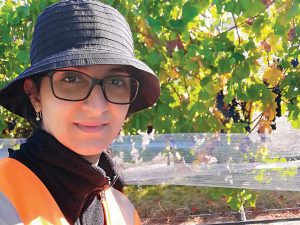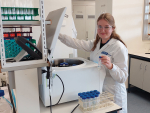Romy Moukarzel grew up Beqaa Valley, Lebanon's largest wine producing region and home to French cultivars like Cinsault, Carignan and Grenache.
She completed her agriculture engineering degree in the Lebanese University of Beirut where she developed an interest in land management, plant protection and the viticulture industry in Lebanon. She then received a full scholarship from the European Union to do a Master’s degree in Sustainable Agriculture in the Mediterranean Agronomic Institute of Chania in Greece.
Guided by her growing passion for sustainable agriculture concepts, Romy undertook a research project on plant viruses in the institute’s Molecular Microbiology and Virology group. Romy’s interest in finding new sustainable viticulture management practices to improve plant health then led her to do a PhD in Plant Pathology and Mycology at Lincoln University, where her research project looked at the factors affecting arbuscular mycorrhizal fungi (AMF) in New Zealand vineyards. Her research showed that these beneficial fungi are important factors for developing secure and ecological management practices that contribute to the economy and the sustainability of grape growing.
The research identified the AMF communities associated with grapevines and determined that rootstock, management practices as well as soil factors drive these communities. The project was supervised by Associate Professor Eirian Jones, Associate Professor Hayley Ridgway and Dr Alexis Guerin-Laguette, and was funded by Plant & Food Research and Lincoln University.
After submitting her PhD thesis, Romy moved straight into a postdoctoral research position where she is currently working on deciphering the yield-quality seesaw via manipulations of competing sinks, bunch micro-climate and crop load. This project is part of the New Zealand Winegrowersled Pinot Noir Project, funded by the Ministry of Business, Innovation and Employment, under the supervision of Professor Brian Jordan, Professor Rainer Hofmann, Dr Olaf Schelezki and Dr Amber Parker. Romy’s research aims to provide insight into grapevine biochemistry and physiology in Pinot Noir grapes in the context of growing conditions and vine management, to facilitate decision-making of growers to break the seesaw and thus enhance the resilience of New Zealand Pinot Noir.














